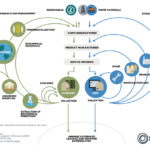
Are you an ambitious entrepreneur seeking to take your business to new heights? In today’s fast-paced and competitive business landscape, it is essential to find innovative ways to stand out from the crowd. That’s where a Startup Accelerator comes into play.
Accelerator programs, as a distinct form of innovation intermediary (Crișan et al., 2021), have emerged in recent years as a new model to support startups (Del Sarto et al., 2022a); and it has been reported that startups that have graduated from acceleration programs have approximately a 23% higher survival rate compared to other newly created companies (Regmi et al., 2015).
On the other hand, the startups accelerators have become very popular among young entrepreneurs interested in developing products, attracting investors, or establishing relationships with industry representatives from large companies (Bańka et al., 2023); as they cater to their needs in the early stages of entrepreneurship.
The startups accelerators is a powerful tool that has shown to change the game for countless emerging companies, propelling them to unimaginable success. By providing a unique combination of mentoring, resources, and networking opportunities, a startup accelerator can help you unleash the full potential of your business.
Whether you are a tech genius with an innovative idea or a passionate individual with a vision, joining a startup accelerator can be the catalyst that catapults your business to the next level.
In this article, we will explore the incredible benefits of the startups accelerators and why it is essential for any determined entrepreneur looking to make their mark in the business world.
What is a startup accelerator?
A startup accelerator, also known as seed accelerators or business accelerators, is a program designed to help early-stage companies grow rapidly and achieve their goals. Unlike incubators, which focus on providing space and support for new companies to develop their ideas, accelerators offer a more intensive and structured approach.
According to Cohen et al., (2019), a startup accelerator is “a fixed-term, cohort-based program for startups that includes mentorship and/or educational components, culminating in a graduation event.” Meanwhile, Pauwels et al., (2016) state that accelerators have become a general term for any program that provides a structured mentoring service, networking opportunities, and access to funding.
Typically, a startup accelerator operates within a fixed timeframe, ranging from a few months to a year. During this period, selected startups receive mentoring, access to industry experts, resources, and sometimes initial funding. The goal is to accelerate business growth and increase their chances of success in the market.
Joining a startup accelerator can be a transformative experience for entrepreneurs. It provides a supportive environment where founders can connect with like-minded individuals, learn from experienced mentors, and expose themselves to potential investors and customers.
By participating in a structured program that focuses on key areas such as product development, marketing, and business strategy, startups can gain a competitive edge and significantly increase their chances of success. The guidance and resources provided by a startup accelerator can help entrepreneurs avoid common mistakes and overcome the challenges of launching a new business.
Additionally, being part of a startup accelerator can open doors to valuable partnerships and collaborations. Many accelerators have strong networks with industry leaders, venture capitalists, and successful entrepreneurs. These connections can provide startups with opportunities for partnerships, strategic alliances, and even acquisition offers.
Furthermore, the exposure gained through demo days and other exhibition events organized by the startup accelerator can attract the attention of potential customers and investors, helping startups gain traction and secure crucial funding.
Types of startups accelerators
Seed Accelerators
According to Hochberg (2016), seed accelerators, or general accelerators, are fixed-term, cohort-based “boot camps” for startups that offer educational and mentoring programs for emerging company founders, exposing them to a wide variety of mentors, including former entrepreneurs, venture capitalists (VCs), angel investors, and corporate executives. The program culminates in a public launch event or “demo day,” during which the graduating cohort of startups presents their businesses to a large group of potential investors.
University Accelerators
Over the last decade, universities have invested heavily in startup accelerator programs (Metcalf et al., 2021, and Maritz et al., 2021); these accelerators not only enhance local entrepreneurship ecosystems but also influence the competitiveness and influence of startups in regional development, employment, and prosperity (Franco, 2020).
According to Maritz et al., (2021), university accelerators focus on providing programs aimed at supporting startups and their founders, access to various support services and networking events, and engagement with the broader community where entrepreneurs can seek further opportunities.
Corporate Accelerators
Kohler (2016) and Gutmann et al., (2019) report that corporate accelerators are on the rise as large corporations adopt an open innovation strategy, increasing their focus on startups as a source of external innovation.
Corporate accelerators offer a potent approach to fostering entrepreneurial innovations.
Social Impact Accelerators
According to Yang et al., (2020), a social impact accelerator is designed to help social startups generate social/environmental impact alongside financial returns.
Benefits of joining a startup accelerator
Joining a startup accelerator offers numerous benefits that can significantly impact the success of your business. According to Cohen et al., (2019), business accelerators provide networking, education, and mentoring opportunities by attracting peers and mentors from the broader regional community, such as successful entrepreneurs, accelerator program alumni, venture capitalists, angel investors, lawyers, accountants, or corporate executives.
Let’s explore some of the key advantages:
Access to Mentoring and Expertise
One of the most valuable aspects of a startup accelerator is access to experienced mentors and industry experts. These mentors have a wealth of knowledge and can provide guidance on various aspects of your business, from product development to marketing strategies. Their insights can help you avoid costly mistakes and make informed decisions that drive your business forward.
Networking Opportunities
A startup accelerator provides a unique platform to connect with like-minded entrepreneurs, industry leaders, and potential investors. Regarding this, Aljalahma and Slof (2022) emphasize that accelerators serve as networking builders by encouraging other organizations to develop the innovation ecosystem, fostering relationships among startups through events, communication, and coworking (Moritz et al., 2022).
The connections you make during the program can open doors to partnerships, collaborations, and funding opportunities. Being part of a vibrant and supportive community can also boost your motivation and help you stay focused on your goals.
Resources and Infrastructure
Startup accelerators often provide resources such as office space, equipment, and software tools to support your company’s growth. Access to these resources can save significant costs and allow you to allocate your budget to other critical areas of your business.
Del Sarto et al., (2022b) highlight that acceleration programs are coworking spaces where startups have access to valuable sources of knowledge for innovation.
Additionally, accelerators may offer legal, accounting, and other professional services to help you navigate complex business requirements.
Validation and Credibility
Joining a reputable startup accelerator adds credibility to your business. It shows potential investors, partners, and customers that your idea has been scrutinized and acknowledged by industry experts. This validation can increase confidence in your brand and facilitate attracting the resources and support you need to scale your business.
Intensive Learning Experience
Startup accelerators often offer structured workshops and educational programs covering a wide range of topics relevant to startups. From market analysis to financial planning, these programs can equip you with essential skills and knowledge crucial for building a successful business.
The immersive nature of the accelerator experience ensures that you are constantly learning and growing as an entrepreneur. Accelerators foster a culture of innovation, speed up the invention process, help businesses generate new ideas, test those ideas, and share the results (Aljalahma and Slof, 2022).
Success Stories of Startup Accelerators
The Startups accelerators have a proven track record of catapulting businesses to success. Let’s take a look at some notable success stories:
Airbnb
Airbnb, the global hospitality marketplace, went through the Y Combinator accelerator program in 2009. The program provided valuable mentoring and guidance, helping the founders refine their business model and pitch. Today, Airbnb is valued at billions of dollars and has revolutionized the way people travel and experience accommodation.
Dropbox
Dropbox, the popular cloud storage platform, also emerged from the Y Combinator accelerator program. The founders leveraged the mentoring and resources provided by the program to refine their product and scale their business. Dropbox is now a household name and has millions of users worldwide.
Stripe
Stripe, the online payment processing company, participated in the Y Combinator accelerator program in 2010. The program helped the founders fine-tune their business strategy and connect with potential customers and investors. Today, Stripe is one of the leading players in the payments industry, processing billions of dollars in transactions annually.
These success stories demonstrate the transformative power of startup accelerators. By providing the right support, mentoring, and resources, accelerators can help entrepreneurs turn their ideas into thriving businesses.
How to choose the right startup accelerator for your business
Choosing the right startup accelerator is essential to maximize benefits and increase the chances of success. In this regard, Butz and Mrożewski (2021) report six critical criteria for commercial and impact accelerators:
- Demand validation: Is there evidence of customer interest or demand validation?
- Market demographics: Is there a demographic and market size analysis?
- Concept maturity: Is there evidence that the concept can be turned into a product?
- Value proposition: Is there evidence of tangible or intangible benefits for customers?
- Technology expertise: Does the startup team possess product development skills?
- Growth strategy: Is there evidence of strategies and potential for future growth?
In this framework, I present you with some factors to consider when evaluating potential accelerators:
Program Focus
Different startup accelerators have different areas of specialization and focus. Some may specialize in technology startups, while others have a broader scope. Consider your industry and the specific challenges your business faces to find an accelerator with relevant experience and resources.
Track Record
Research the accelerator’s track record and evaluate its success rate. Look for testimonials and success stories from previous participants to measure the value they gained from the program. A strong track record indicates that the accelerator has a proven formula for supporting startups.
Mentorship Network
Evaluate the quality and diversity of the startup accelerator’s mentorship network. Look for mentors with experience in your industry who can provide valuable guidance tailored to your business needs. A strong mentor network increases the chances of receiving personalized support and forming valuable connections.
Resources and Support
Assess the resources and support services provided by the startup accelerator. This could include access to office space, equipment, funding opportunities, legal and accounting services, and more. Consider which resources are essential for your business’s growth and ensure the accelerator can meet those needs.
Culture and Values
Consider the culture and values of the startup accelerator. It’s essential to align with an accelerator that shares your vision and values to ensure a productive and supportive environment. Research the accelerator’s spirit, community dynamics, and alumni network to evaluate if it’s the right fit for you.
Location
Take into account the location of the startup accelerator. While some accelerators operate virtually, others may require you to relocate to a specific city or region. Think about the potential benefits and drawbacks of the location in terms of access to markets, talent, and resources.
By carefully evaluating these factors, you can choose an accelerator that aligns with your business’s needs and maximizes your chances of success.
The Application Process for Startup Accelerators
The application process for startup accelerators can vary, but it generally involves several stages. Here is a typical outline of the application process:
Research and Preselection
Begin by researching different startup accelerators and preselect those that align with your business and objectives. Consider their focus areas, program duration, and location. Look for accelerators that have a track record of supporting businesses similar to yours.
Application Form
Most startup accelerators require completing an online application form. This form typically asks for information about your business, team, market opportunity, and traction. Be concise and compelling in your responses, highlighting the unique aspects of your business and why it’s a good fit for the accelerator.
Pitch Deck
In addition to the application form, accelerators often require a pitch deck or presentation that provides more information about your business. This pitch should be concise, visually appealing, and highlight key aspects such as your value proposition, market analysis, business model, and growth strategy. Tailor your pitch to demonstrate how the accelerator can help you achieve your goals.
Interviews
If your application is shortlisted, you may be invited to an interview. This could be an individual interview with the startup accelerator team or a panel interview. Prepare for the interview by researching the accelerator’s expectations and be ready to articulate your vision and demonstrate your passion for your business.
Selection and Acceptance
After the interviews, the startup accelerator will evaluate all applications and select the startups it believes have the most potential. If accepted, you will receive an offer letter outlining the terms and conditions of the program. Take the time to review the offer and ask any questions you may have before accepting.
It’s important to note that the application process can be highly competitive, with many startups vying for a limited number of spots. Therefore, it’s crucial to invest time and effort in crafting a compelling application and pitch that effectively communicates the value of your business.
Tips for Getting Your Business into a Startup Accelerator
Getting your business into a startup accelerator is a critical step in securing a spot in the program. Here are some tips to help you create a compelling pitch:
Tell a Story
Start your presentation by telling a compelling story that captures the essence of your business and the problem you’re solving. Engage the accelerator team with a narrative that showcases your passion and highlights the unique aspects of your business.
Clearly Communicate Your Value Proposition
Articulate your value proposition clearly and explain why your solution is unique and better than existing alternatives. Highlight the market opportunity and growth potential. Use data and evidence to support your claims.
Demonstrate Traction
If you have any traction, such as customer testimonials, revenue, or partnerships, make sure to showcase them in your presentation. This demonstrates that your business has the potential to make a real-world impact and attract interest from customers and investors.
Explain How the Accelerator Can Help
Research the offerings of the startup accelerator and tailor your presentation to demonstrate how joining the program will benefit your business. Highlight specific areas where you believe the accelerator’s resources and mentorship can help overcome challenges and accelerate your growth.
Practice and Refine
Practice your presentation several times to ensure you can confidently and concisely communicate the value of your business. Seek feedback from trusted advisors or mentors and refine your pitch based on their input. Aim for a balance between being informative and engaging.
Remember, a strong pitch is essential to capture the attention of the startup accelerator team and stand out among other applicants. Invest time in perfecting your pitch to increase your chances of success.
What to Expect During a Startup Acceleration Program
Once accepted into a startup accelerator program, you can expect an intense and transformative experience. Here is what you can typically expect during a startup acceleration program:
Structured Curriculum
Accelerators usually provide a structured curriculum that covers various aspects of building a successful business. This may include workshops, seminars, and one-on-one mentoring sessions. The curriculum is designed to equip you with the knowledge and skills needed to overcome challenges and accelerate growth.
Milestone-Driven Progress
Accelerators often set milestones and goals for each participating startup. These milestones provide a framework for tracking progress and ensuring that the startups stay on track. Meeting these milestones is crucial to demonstrate progress and increase your chances of attracting more funding and support.
Demo Days and Exhibitions
Most accelerators organize demo days or exhibitions where startups present their progress and pitch to investors, partners, and potential customers. These events serve as a platform for startups to gain exposure, attract funding, and form valuable connections. Prepare for these events by refining your pitch and showcasing your business’s achievements.
Peer Learning and Collaboration
Being part of a startup accelerator means being surrounded by a community of like-minded entrepreneurs. Take advantage of this opportunity to learn from your peers, share knowledge, and collaborate on common challenges. The support and camaraderie within the accelerator community can be invaluable in navigating the ups and downs of entrepreneurship.
Continuous Feedback and Iterations
Expect to receive continuous feedback from mentors, advisors, and the startup accelerator team. Embrace this feedback as an opportunity for growth and improvement. Iterate on your business strategy, product, and marketing based on the insights you receive. This iterative approach is key to refining your business and maximizing its potential.
Access to Investors and Funding Opportunities
Accelerators often have strong networks with investors and can provide valuable introductions. Leverage these connections to pitch your business and secure funding. Be proactive in seeking funding opportunities and leverage the accelerator’s reputation and network to attract investments.
Overall, expect an immersive and fast-paced experience during a startup acceleration program. Embrace the challenges and opportunities that come your way and be prepared to work hard and seize every opportunity to grow your business.

List of Startup Accelerators
In the following table, we provide you with a list of business accelerators in countries such as Spain, Mexico, Chile, and with a global reach:
- Y Combinator
- TheVentureCity
- Platanus Ventures
- MassChallenge
- Techstarts
- 500 Global
- Google for Startups Accelerator
Conclusion
Business accelerators play an important role in stimulating entrepreneurship (Pauwels et al., 2016), which has encouraged the emergence of startup accelerators within universities or corporations.
Unlike business incubators, startup accelerators connect entrepreneurs with the market and potential investors, allowing them to accelerate their growth.
Whether your venture is for-profit or social, accelerators could be a good alternative to achieve business success and overcome the well-known “valley of death” for startups.
Ultimately, participating in a startup accelerator can help you build networks and collaborations with other entrepreneurs, as well as identify potential investors for your business.
Bibliographic References
Aljalahma, J.; Slof, J. An Updated Systematic Review of Business Accelerators: Functions, Operation, and Gaps in the Existing Literature. J. Open Innov. Technol. Mark. Complex. 2022, 8, 214. https://doi.org/10.3390/joitmc8040214
Banka, M., Salwin, M., Waszkiewicz, A. E., Rychlik, S., & Kukurba, M. (2022). Startup Accelerators. International Journal of Management and Economics, 58(1), 80-118.
Butz, H.; Mrozewski, M.J. The Selection Process and Criteria of Impact Accelerators. An Exploratory Study. Sustainability 2021, 13, 6617. https://doi.org/10.3390/su13126617
Cohen, S., Fehder, D. C., Hochberg, Y. V., & Murray, F. (2019). The design of startup accelerators. Research Policy, 48(7), 1781-1797.
Crișan, E.L., Salanță, I.I., Beleiu, I.N. et al. A systematic literature review on accelerators. J Technol Transf 46, 62–89 (2021). https://doi.org/10.1007/s10961-019-09754-9
Del Sarto, N., Cazares, C. C., & Di Minin, A. (2022a). Startup accelerators as an open environment: The impact on startups’ innovative performance. Technovation, 113, 102425.
Del Sarto, N., Ferrigno, G., Parida, V. et al. (2022b) Do start-ups benefit from coworking spaces? An empirical analysis of accelerators’ programs. Rev Manag Sci (2022). https://doi.org/10.1007/s11846-022-00587-9
Franco, Mário. 2020. “Entrepreneurship, Competitiveness and Innovation” Sustainability 12, no. 16: 6576. https://doi.org/10.3390/su12166576
Gutmann, T., Kanbach, D., & Seltman, S. (2019). Exploring the benefits of corporate accelerators: Investigating the SAP Industry 4.0 Startup Program. Problems and Perspectives in Management, 17(3), 218.
Hochberg, Y. V. (2016). Accelerating entrepreneurs and ecosystems: The seed accelerator model. Innovation policy and the economy, 16(1), 25-51.
Kohler, T. (2016). Corporate accelerators: Building bridges between corporations and startups. Business horizons, 59(3), 347-357.
Maritz, Alex, Quan Nguyen, and Hsin-Ming Hsieh. 2021. “Exploring the Strategic Intent and Practices of University Accelerators: A Case of Australia” Sustainability 13, no. 19: 10769. https://doi.org/10.3390/su131910769
Metcalf, L. E., Katona, T. M., & York, J. L. (2021). University startup accelerators: startup launchpads or vehicles for entrepreneurial learning?. Entrepreneurship Education and Pedagogy, 4(4), 666-701.
Moritz, A., Naulin, T., & Lutz, E. (2022). Accelerators as drivers of coopetition among early-stage startups. Technovation, 111, 102378.
Pauwels, C., Clarysse, B., Wright, M., & Van Hove, J. (2016). Understanding a new generation incubation model: The accelerator. Technovation, 50, 13-24.
Regmi, K., Ahmed, S. A., & Quinn, M. (2015). Data driven analysis of startup accelerators. Universal Journal of Industrial and Business Management, 3(2), 54-57.
Yang, S., Kher, R., & Newbert, S. L. (2020). What signals matter for social startups? It depends: The influence of gender role congruity on social impact accelerator selection decisions. Journal of Business Venturing, 35(2), 105932.





